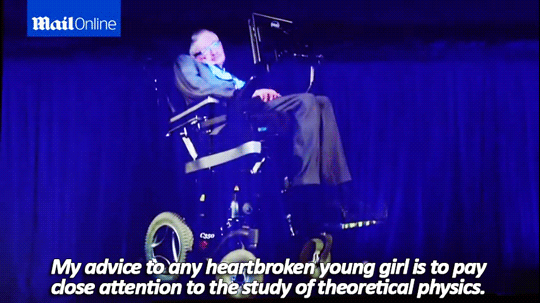Hello! First Of All, Thanks So Much For This Awesome Blog. I Wanted To Ask If You Have Suggestions On
Hello! First of all, thanks so much for this awesome blog. I wanted to ask if you have suggestions on how I can deepen my understanding of psychology—I am INFJ and I'm personally interested in using study the way you do to derive insights and interpretations because I have always been interested in the field. However, when I try to read textbooks or formal sources of information I find myself unable to apply the information or really see the 'point' of it; what should I approach as a beginner?
I’m not sure that I can give you an encouraging response because, in reality, the path of independent learning is a difficult one to travel, and sometimes it is only your own passion that sustains you, i.e., you must be intrinsically motivated.
Keep reading
More Posts from Deluded-wanderer and Others
“Think of it this way, success is fine while failure is also acceptable.”
— Yan Bi Xiao Sheng, [Li Qiye] Emperor’s Domination
You have two coworkers named John, one short and one tall. As you normally would in this situation, you call them Big John and Little John. One day the tall John tells you that he doesn’t like being called Big John. You’re a decent person and stop doing it. It turns out when his depression was at its worst, he gained a lot of weight, and even though he’s lost weight and is secure in his body image, being called Big John reminds him of that time. He’s much more comfortable being called Tall John, Old John, his last name, or just John
You call everyone dude. You were raised in an area where dude is an all-purpose term. One day your coworker Mary tells you that she doesn’t like being called dude. You’re a decent person and stop doing it. It turns out she’s trans, and even though she’s transitioned and is satisfied and secure in her body, being called dude makes her dysphoric. She’s much more comfortable being called girl, pal, or just Mary.
If situation one is so obvious, why isn’t two? Just be a decent person, don’t call people what they don’t want to be called, and don’t make them give you their reasons. It’s that simple
Can you do a type contrast between ISFJ and ISTP using characters as an example? I figure the two types would be quite different.
They use Fe quite differently, as you might imagine.
Think about Prim and Haymitch from The Hunger Games.
As a high Fe / feeler, Prim genuinely cares about people and their needs and their emotional state. She is more effective than her sister at figuring out people’s emotional motives and helping them through them, and has chosen a profession for herself which enables her to directly assist people in a tangible way. She is quiet, thoughtful, insightful, and hard-working, with a tender heart. She loves all creatures, even her mangy old cat. Prim excels in one specific thing (medicine) and has become very good at it through repeated usage of / interest in it (Si finding a favorite niche, unique to themselves).
Haymitch approaches Fe in an analytical, detached way -- he uses it purely to gain sponsorships and ensure his own and Katniss’ survival, reminding her she must be ‘likable’ in order to gain sympathy from the audience. This illustrates the difference between the genuine concern of high Fe and using it to an advantage, to support a logical conclusion (she needs sponsors, they must learn to like her, ergo -- be flattering and appealing to get what you want -- something Katniss as an ISTJ doesn’t understand, because to her, it’s insincere). He did whatever he had to in the arena to survive, he has no specific way he approaches life (winging it and thinking the kids will have no choice but to do so, in the arena), and he longs for freedom from constraints. He’s opportunistic (Se) not studied (Si).
- ENFP Mod

NEWS FLASH: BLACK LIVES STILL MATTER

“Every habit produces multiple outcomes across time. Unfortunately, these outcomes are often misaligned. With our bad habits, the immediate outcome usually feels good, but the ultimate outcome feels bad. With good habits, it is the reverse: the immediate outcome is unenjoyable, but the ultimate outcome feels good. […] The road less traveled is the road of delayed gratification. If you’re willing to wait for the rewards, you’ll face less competition and often get a bigger payoff. As the saying goes, the last mile is always the least crowded.”
— James Clear, Atomic Habits
I’ve gotten a lot of asks about the enneagram/MBTI breakdown of likelihood, so I’m going to try to expand a bit, in no particular order. Some repetition from the original post will be here because people don’t read so saying things a bunch of times increases the chances that they’ll see it once.
One thing that is absolutely essential to understand is that enneagram cores are a zero-sum game. Which is to say: even allowing for some error bars, something like two-thirds of INTPs are type 5. That means at most a third can be any other type, so obviously no other type will be remotely as common. So I might refer to another INTP enneatype as “competing with 5″ - it can’t be super common in INTPs because it’s drowned out by the 5s. You can’t have more than 100%.
Finally: this is going to be a long post but I think it’s better to not break it up as there will be references to all types across the board and I don’t want to interlink three or nine different posts. That said I’m going to make a “diagnosis” post for people who believe they are in the “check your typing” category.
Enneagram 1 is most heavily correlated with TJs because it fits with a certain rigidity and individualization of the moral code found in lower Fi users. It is particularly common in the IxTJs, and slightly more common in SJs than NJs. It’s found in the FJs as well but less so, possibly because 1s are often very critical, and certainly because it competes with 2 in the FJs. It’s very rare in perceivers across the board because 1 requires a certain adherence to external standards found in Te or Fe to avoid corruption; it’s also associated with perfectionism which is much more commonly a judger thing.
Enneagram 2 is heavily correlated with FJs because it’s about wanting to be loved, which fits very closely with the Fe desires for approval and belonging to a group and universally understood symbols of affection. It’s also found in the high Fi users - it’s less common, but still possible for all of them. It is really not found in thinkers; when thinkers want approval from others it is almost always in the form of competency, not love through service to others. Enneagram 2 is just…heavily in line with what it means to be a feeler in MBTI and in direct conflict, for the most part, with what it means to be a thinker.
Enneagram 3, and indeed the shame triad in general, is associated heavily with how other people see you. Enneagram 3 is particularly interested in standing out from the crowd so it’s much more common in extroverts, especially TJs, with significant FJ and ExTP representation (less so in the Fi-auxes). It’s a little more common in the NJs than the SJs; my guess is both that the SJs are competing with 1 and 6, and there’s something very high Ni/ low Se about projecting a specific distinguished persona. It’s found in the introverted judgers as well, though it’s far less common. Because it’s more common in NJs than SJs and TJs than FJs, it does fall off the radar for ISFJ.
Enneagram 4 is not the same as Fi but it does correlate strongly with high Fi; high Fi is interested more in authenticity and 4 is more interested in uniqueness, but the self-expressiveness and thirst for originality and individuality end up coinciding pretty frequently. Enneagram 4 is also found in the FJs; all the FJ types have decent shame triad representation, given that Fe is interested in the response they elicit in others and frequently want approval in some form or another. It’s competing with 2 and in some cases 3, so it’s often rarer, but it does show up. 4 is very rare in thinkers but it isn’t unheard of in the ExTPs. As for why specifically ExTPs, I suspect it’s first that their feeling is decent, and unlike with lower Fi which tends to turn inward (hence enneagram 1 in IxTJs) it tends to go outward looking for approval from others. Add that to the thirst for novelty in Se or Ne, and you get a small but extant number of ExTP 4s.
Enneagram 5 is in a way analogous to 2 but for thinkers; if your response to fear is to try and back off and try to comprehend it and learn logical and factual tools, rather than seeking out other people or distracting from it, you are almost certainly a thinker, and you are much more likely to be an introvert. And so: it’s incredibly common in Ti-doms, pretty common in IxTJs, and not unheard of in the ExTJs or ENTP. It’s actually very rare in ESTPs too because it involves a withdrawal from the environment that is counter to Se-dom motivations.
Enneagram 6 is not unheard for anyone! As I’ve said elsewhere, I think trying to gather a real-world safety net of people and guidance is maybe the most fundamentally human response to fear. It’s super common. It is most common in the SJs and is the most common type overall for ISFJs.
Enneagram 7 is really highly correlated with dom Se or Ne. 7s are spontaneous and like to experience a lot of things, so this is unsurprising. As a result, 7 is less common in introverts or high Si or Ni users. It’s even more highly correlated with Se than Ne, so ISxPs are sometimes 7s, but the rest of the introverts are pretty much never 7. It’s rare in ESTJs and due to competing with 6 and 2, pretty much unheard of in ESFJs.
Enneagram 8 is much more likely in extroverts and in thinkers - most 8s are ExTxs. It’s very much about taking control of your own life within an environment, so it’s more associated with extroverted functions but particularly Se and Te. It’s also very much in conflict with dom Fi; the combination of Fi individuality and 8 independence play off the worst aspects of each other and so while it could happen, it’s really unlikely to be remotely functional as a combination.
Enneagram 9, rather like 6, is pretty universal. The one exception is Te-doms; dom Te tends to be far too forceful to mesh with the passiveness of enneagram 9. It’s an especially common enneatype for IxxPs and is pretty common among IxFJs as well.










Professor Stephen Hawking believes Zayn might still be in One Direction - in a different universe
-
 veriaph reblogged this · 2 months ago
veriaph reblogged this · 2 months ago -
 venmotif liked this · 2 months ago
venmotif liked this · 2 months ago -
 yourfanderfriend liked this · 5 months ago
yourfanderfriend liked this · 5 months ago -
 waterlilyily liked this · 6 months ago
waterlilyily liked this · 6 months ago -
 agardenofdaydreams liked this · 9 months ago
agardenofdaydreams liked this · 9 months ago -
 johnbog liked this · 9 months ago
johnbog liked this · 9 months ago -
 hnyycmb liked this · 9 months ago
hnyycmb liked this · 9 months ago -
 shallowcloudz liked this · 1 year ago
shallowcloudz liked this · 1 year ago -
 luneocquicrpostatumn liked this · 1 year ago
luneocquicrpostatumn liked this · 1 year ago -
 mozagg liked this · 1 year ago
mozagg liked this · 1 year ago -
 kingofmampally reblogged this · 1 year ago
kingofmampally reblogged this · 1 year ago -
 kingofmampally liked this · 1 year ago
kingofmampally liked this · 1 year ago -
 litnightsky liked this · 2 years ago
litnightsky liked this · 2 years ago -
 pickled-tomato-fries-blog liked this · 2 years ago
pickled-tomato-fries-blog liked this · 2 years ago -
 drageredet liked this · 2 years ago
drageredet liked this · 2 years ago -
 mccynjiggy liked this · 2 years ago
mccynjiggy liked this · 2 years ago -
 loveshick liked this · 2 years ago
loveshick liked this · 2 years ago -
 starliyuu liked this · 2 years ago
starliyuu liked this · 2 years ago -
 moniblues liked this · 2 years ago
moniblues liked this · 2 years ago -
 decksd4rk liked this · 3 years ago
decksd4rk liked this · 3 years ago -
 mrpinkster liked this · 3 years ago
mrpinkster liked this · 3 years ago -
 n0t-a-whale liked this · 3 years ago
n0t-a-whale liked this · 3 years ago -
 keno liked this · 3 years ago
keno liked this · 3 years ago -
 purelyeve liked this · 3 years ago
purelyeve liked this · 3 years ago -
 yesbleume liked this · 3 years ago
yesbleume liked this · 3 years ago -
 pensivefine liked this · 3 years ago
pensivefine liked this · 3 years ago -
 hoefordabi liked this · 3 years ago
hoefordabi liked this · 3 years ago -
 astriidd liked this · 4 years ago
astriidd liked this · 4 years ago -
 clarawanka liked this · 4 years ago
clarawanka liked this · 4 years ago -
 candidaa liked this · 4 years ago
candidaa liked this · 4 years ago -
 weirdhill liked this · 4 years ago
weirdhill liked this · 4 years ago -
 deluded-wanderer reblogged this · 4 years ago
deluded-wanderer reblogged this · 4 years ago -
 deluded-wanderer liked this · 4 years ago
deluded-wanderer liked this · 4 years ago -
 mystiquestar liked this · 5 years ago
mystiquestar liked this · 5 years ago -
 likefallinginlovewithalandslide liked this · 5 years ago
likefallinginlovewithalandslide liked this · 5 years ago -
 m-a-r-x-i-a liked this · 5 years ago
m-a-r-x-i-a liked this · 5 years ago -
 monachopsism liked this · 5 years ago
monachopsism liked this · 5 years ago -
 healinghealthy liked this · 5 years ago
healinghealthy liked this · 5 years ago -
 stella-polaris liked this · 5 years ago
stella-polaris liked this · 5 years ago -
 slytemmie liked this · 5 years ago
slytemmie liked this · 5 years ago -
 chezprintemps liked this · 5 years ago
chezprintemps liked this · 5 years ago -
 partlytruthwalkingcontradiction liked this · 5 years ago
partlytruthwalkingcontradiction liked this · 5 years ago

Take good care of yourself so you can care for others as well.
91 posts